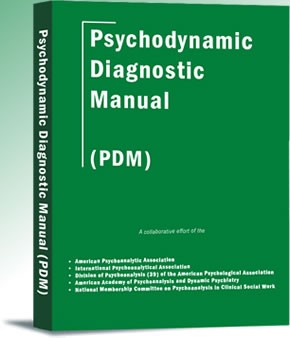





 | 
|  |
 |  |  | ||||||||
..Janet | ..Alexander | ..Bowlby | ..Cannon | .......Kandel | ......Edelman | ..James | Clérambault | .....Freud | ....Lacan | ...Lebovici | ....Klein | ...Jung | ...Bion |
|
Le site des recherches sur les psychothérapies psychodynamiques |
||||||
      |
 |
Le Manuel Diagnostique Psychodynamique |
Diagnostic différentiel des troubles de la personnalités comme classe
Niveau d'organisation (Sévérité du Trouble de la Personnalité )
Personnalités en bonne santé (Absence de Trouble de la Personnalité)
Troubles de la Personnalité de niveau névrotique
Troubles de la Personnalité de niveau Borderline
Implications de la dimension de la sévérité pour la psychothérapie
Types de Troubles de la Personnalité
Capacité de Régulation, Attention, et d'Apprentissage
Capacité de Relations interpersonnelle (Incluant Profondeur, Gamme, et Consistence)
Qualité d'Experience Interne (Level of Confidence and Self-Regard)
Expérience, Expression, and Communication Affective
Mécanismes and Capacités de Défenses
Capacité de Former des Représentations Internes
Capacité de Différenciation et d'Integration
Capacités d'Auto-Observation (Psychological-Mindedness)
Capacity for Internal Standards and Ideals: A Sense of Morality
Sommaire du fonctionnement mental de base
Configurations symptomatiques : L'Experience Subjective- Axe S
Introduction
Symptom Patterns
S301. Adjustment Disorders
S302. Anxiety Disorders
S302.1 Psychic Trauma and Posttraumatic Stress Disorder
S302.2 Phobias
S302.3 Obsessive-Compulsive Disorders
S303. Dissociative Disorders
S304. Mood Disorders
S304.1 Depressive Disorders
S304.2 Bipolar Disorders
S305. Somatoform (Somatization) Disorders
S306. Eating Disorders
S307. Psychogenic Sleep Disorders
S308. Sexual and Gender Identity Disorders
S308.1 Sexual Disorders
S308.2 Paraphilias
S308.3 Gender Identity Disorders
S309. Factitious Disorders
S310. Impulse Control Disorders
S311. Addictive/Substance Abuse Disorders
S312. Psychotic Disorders
S313. Mental Disorders Based on a General Medical Condition
Case Illustrations of PDM Profile with Adult Mental Health Disorders
Introduction à la deuxième partie
Profil du fonctionnement mental des Enfants et des Adolescents - Axe MCA
Capacity for Regulation, Attention, and Learning
Capacity for Relationships (Including Depth, Range, and Consistency)
Quality of Internal Experience (Level of Confidence and Self-Regard)
Affective Experience, Expression, and Communication
Defensive Patterns and Capacities
Capacity to Form Internal Representations
Capacity for Differentiation and Integration
Self-Observing Capacities (Psychological-Mindedness)
Capacity for Internal Standards and Ideals: Sense of Morality
Summary of Child and Adolescent Mental Functioning
Definition of Terms of Mental Functioning
Configurations et troubles de la personnalité de l'Enfant et de l'Adolescent - Axe PCA
Emerging Personality Styles in Children and Adolescents
“Normal” Emerging Personality Patterns
Mildly Dysfunctional Emerging Personality Patterns
Moderately Dysfunctional Emerging Personality Patterns
Severely Dysfunctional Emerging Personality Patterns
Developmental Aspects of Emerging Personality Patterns
Normal Range of Patterns
Dysfunctional Personality Patterns
Configurations symptomatiques chez l'Enfant et l'Adolescent : l'Expérience subjective - Axe SCA
Healthy Response
Developmental Crises
Situational Crises
Disorders of Affect
Anxiety Disorders
SCA301. Anxiety Disorders
SCA302. Phobias
SCA303. Obsessive-Compulsive Disorders
SCA304. Somatization (Somatoform) Disorders
Affect/Mood Disorders
SCA305. Prolonged Mourning/Grief Reaction
SCA306. Depressive Disorders
SCA307. Bipolar Disorders
SCA308. Suicidality
Disruptive Behavior Disorders
SCA309. Conduct Disorders
SCA310. Oppositional-Defiant Disorders
SCA311. Substance Abuse Related Disorders
Reactive Disorders
SCA312. Psychic Trauma and Posttraumatic Stress Disorder
SCA313. Adjustment Disorders (other than developmental)
Disorders of Mental Functioning
SCA314. Motor Skills Disorders
SCA315. Tic Disorders
SCA316. Psychotic Disorders
SCA317. Neuropsychological Disorders
SCA317.1 Visual-Spatial Processing Disorders
SCA317.2 Language and Auditory Processing Disorders
SCA317.3 Memory Impairments
SCA317.4 Attention Deficit/Hyperactivity Disorder (AD/HD)
SCA317.5 Executive Function Disorders
SCA317.6 Severe Cognitive Deficits
SCA318. Learning Disorders
SCA318.1 Reading Disorders
SCA318.2 Mathematics Disorders
SCA318.3 Disorders of Written Expression
SCA318.4 Nonverbal Learning Disabilities
SCA318.5 Social-Emotional Learning Disabilities
Psychophysiologic Disorders
SCA319. Bulimia
SCA320. Anorexia
Developmental Disorders
SCA321. Regulatory Disorders
SCA322. Feeding Problems of Childhood
SCA323. Elimination Disorders
SCA323.1 Encopresis
SCA323.2 Enuresis
SCA324. Sleep Disorders
SCA325. Attachment Disorders
SCA326. Pervasive Developmental Disorders
SCA326.1 Autism
SCA326.2 Asperger’s Syndrome
SCA326.3 Pervasive Developmental Disorder (PDD) Not Otherwise Specified
Other Disorders
SCA327. Gender Identity Disorders
Case Illustrations of PDM Profile with Child and Adolescent Mental Health Disorders
Section spéciale sur les troubles de la santé mentale de l'enfance et des phases précoces
Introduction
Overview of Primary Mental Health Diagnoses in Infancy and Early Childhood
Overview of the Multi-Axial Approach to Infant and Early Childhood Mental Health and Developmental Disorders
Disorders of Infancy and Early Childhood – Axis I - Primary Axis
IEC100 Series- Interactive Disorders
IEC101. Anxiety Disorders
IEC102. Developmental Anxiety Disorders
IEC103. Disorders of Emotional Range and Stability
IEC104. Disruptive Behavior and Oppositional Disorders
IEC105. Depressive Disorders
IEC106. Mood Dysregulation: A Unique Type of Interactive and Mixed Regulatory-Sensory Processing Disorder Characterized by Bipolar Patterns
IEC107. Attentional Disorders
IEC108. Prolonged Grief Reaction
IEC109. Reactive Attachment Disorders
IEC110. Traumatic Stress Disorders
IEC111. Adjustment Disorders
IEC112. Gender Identity Disorders
IEC113. Selective Mutism
IEC114. Sleep Disorders
IEC115. Eating Disorders
IEC116. Elimination Disorders
IEC200 Series - Regulatory-Sensory Processing Disorders (RSPD)
Clinical Evidence and Prevalence of Regulatory-Sensory Processing Differences
Sensory Modulation Difficulties (Type I)
IEC201. Overresponsive, Fearful, Anxious Pattern
IEC202. Overresponsive, Negative, Stubborn Pattern
IEC203. Underresponsive, Self-Absorbed Pattern
IEC203.1 Self-Absorbed and Difficult-to-Engage Type
IEC203.2 Self-Absorbed and Creative Type
IEC204. Active, Sensory Seeking Pattern
Sensory Discrimination Difficulties (Type II) and Sensory-Based Motor Difficulties (Type III)
IEC205. Inattentive, Disorganized Pattern
IEC205.1 With Sensory Discrimination Difficulties
IEC205.2 With Postural Control Difficulties
IEC205.3 With Dyspraxia
IEC205.4 With Combinations of All Three
IEC206. Compromised School and/or Academic Performance Pattern
IEC206.1 With Sensory Discrimination Difficulties
IEC206.2 With Postural Control Difficulties
IEC206.3 With Dyspraxia
IEC206.4 With Combinations of All Three
Contributing Sensory Discrimination and Sensory-Based Motor Difficulties
IEC207. Mixed Regulatory-Sensory Processing Patterns
IEC207.1 Attentional Problems
IEC207.2 Disruptive Behavioral Problems
IEC207.3 Sleep Problems
IEC207.4 Eating Problems
IEC207.5 Elimination Problems
IEC207.6 Selective Mutism
IEC207.7 Mood Dysregulation, including Bipolar Patterns
IEC207.8 Other Emotional and Behavioral Problems Related to Mixed Regulatory-Sensory Processing Difficulties
IEC207.9 Mixed Regulatory-Sensory Processing Patterns where Behavioral or Emotional Problems Are Not Yet In Evidence
IEC300 Series - Neurodevelopmental Disorders of Relating and Communicating
IEC301. Type I: Early Symbolic, with Constrictions
IEC302. Type II: Purposeful Problem-Solving, with Constrictions
IEC303. Type III: Intermittently Engaged and Purposeful
IEC304. Type IV: Aimless and Unpurposeful
Other Neurodevelopmental Disorders (Including Genetic and Metabolic Syndromes)
Summary Tables of Neurodevelopmental Disorders of Relating and Communicating (NDRC)
Psychoanalytic Therapy Research: Its History, Present Status, and Projected Future
R. S. Wallerstein
Evaluating Efficacy, Effectiveness, and Mutative Factors in Psychodynamic Psychotherapies
S. J. Blatt, J. S. Auerbach, D. C. Zuroff, and G. Shahar
Personality Diagnosis with the Shedler-Westen Assessment Procedure (SWAP): Bridging the Gulf Between Science and Practice
J. Shedler and D. Westen
Psychic Structure and Mental Functioning: Current Research on the Reliable Measurement and Clinical Validity of Operationalized Psychodynamic Diagnostics (OPD) System
R. Dahlbender, G. Rudolf, and the OPD Task Force
Overview of Empirical Support for the DSM Symptom-Based Approach to Diagnostic Classification
A. Herzig and J. Licht
The Empirical Status of Empirically Supported Psychotherapies: Assumptions, Findings, and Reporting in Controlled Clinical Trials
D. Westen, C. Novotny, and H. Thompson-Brenner
Evidence-Based Psychodynamic Psychotherapies
P. Fonagy
A Review of Meta-Analyses of Outcome Studies of Psychodynamic Therapy
F. Leichsenring
Dernière mise à jour : 24/02/11 info@techniques-psychotherapiques.org

|

|